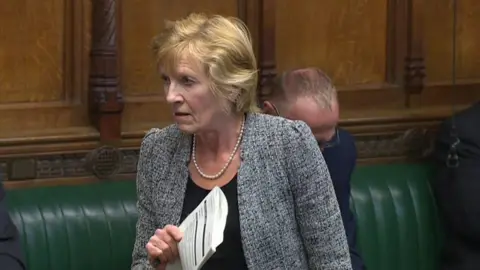Northern Ireland schools set to overspend budget by £33m
 Getty Images
Getty ImagesSchools in Northern Ireland are set to overspend their budgets by about £33m in 2018/19.
That figure was revealed by the Education Authority (EA) during evidence to the NI Affairs Committee at Westminster on Wednesday.
The EA's director of finance said that many schools "simply cannot take any further action to reduce their costs".
The committee of MPs is holding an inquiry into education funding in Northern Ireland.
Three senior staff from the EA gave evidence at the first oral hearing on Wednesday.
During the hearing, Labour MP Stephen Hepburn asked the EA what it was doing to engage the Orange Order in education.
"When I look at their marches you've got kids that size and you've got boys and girls in their teens," he said.
"Surely if these Orange Orders can inspire young people to dress up so smart and look so great and be so proud and everything, they can inspire them to try a bit harder at school?"

Mr Hepburn also asked whether sports stars like Rory McIlroy could also help encourage young people to do well in school.
Meanwhile, the committee's chairman, Dr Andrew Murrison, asked why the Department of Education's (DE) accounts for 2017/18 showed an underspend against initial estimates of £136m.
The accounts detailed the underspend - about 6% of the department's budget - against the spring supplementary estimate.
Dr Murrison asked why the EA had been unable to "prise the sticky fingers of the department of education from this very substantial underspend."
However in separate written evidence published by the committee, the DE said that all aspects of their budget were under "significant pressure."
They said their resource budget had reduced by £233m in real terms since 2010/11.
The department revealed that as a result, less money was being spent per pupil in Northern Ireland's schools this year than was the case at the start of the decade.
'Tipping point'
The EA's chair Sharon O'Connor told the committee that the authority did not have enough money to meet the needs of schools and pupils.
"We are in a financial crisis, we could tip into an educational crisis because if we do not have teachers in classrooms to deliver the service we would be in a very difficult situation," she said.
"We're almost at that tipping point at the moment."
Joyce Bill, director of finance at the EA, said that many schools could not take any further action to reduce costs.
"Based on the information that we have available to us at this time, schools are estimating that they will overspend their common funding formula allocations by about about £32m to £33m," she said.
"Importantly that is after schools have identified just under £11m of additional income and savings, so our schools are doing everything they can do."

In response to a question from North Down MP Lady Hermon, the EA's acting chief executive John Collings told the committee that a backdated 1% pay rise for teachers for 2017/18 was dependent on an end to industrial action by teaching unions.
"We have accrued some funding to pay a teacher's pay rise of 1% for last year, but what we would look to do is to see whether we could achieve more than that," he said.
"However, that has to go with an end to industrial action in schools and that's the discussion we're having at the moment with our colleagues in the trade unions."
Lady Hermon replied: "I thought the days of austerity were over."
The committee is due to hear more oral evidence over the coming months, but while they will eventually produce recommendations they cannot compel any additional funding.
